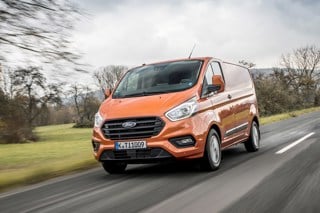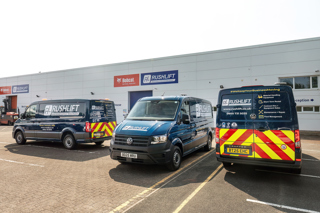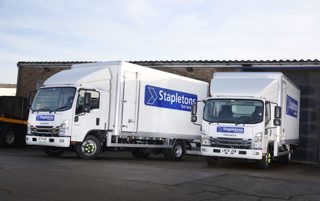Long lead times caused by unprecedented demand and supply-chain constraints have been labelled a “nightmare” by the Association of Fleet Professionals (AFP).
A global shortage of semiconductors and some raw materials, exacerbated by the war in Ukraine, have left fleets facing a wait of a year or more for some vans.
UK automotive trade body, the Society of Motor Manufacturers and Traders (SMMT), says that global supply shortages and economic headwinds “remain a challenge”.
“It's a nightmare,” said Paul Hollick, chair of the Association of Fleet Professionals (AFP). “The bigger fleets are talking about taking whatever they can get, and arguably even thinking about compromising on safety standards, because for some of these vans, the availability is so scarce that they're having to order them without some options, because they're just not available.”
The latest van sales data from the SMMT shows that sales of new light commercial vehicles (LCVs) fell by almost a quarter (23.6%) in March to 40,613 units.
March is conventionally a bumper period due to the introduction of the new bi-annual number plate, with more LCVs registered last month than January and February combined.
However, the SMMT says that supply and delivery issues continue to hamper the sector, including the global shortage of semiconductors, with the March market 38.6% down on pre-pandemic 2019.
Matt Hammond, head of fleet at Altrad UK, explained that, like most fleets, he is seeing “orders cancelled, models discontinued, and lead times extended across all makes and models of vans”.
“We’re having to retain existing vehicles for longer and commit to formal extensions just to ensure we can keep them on fleet,” he said.
Hollick says that OEMs (original engine manufacturers) in the UK aren't really in control of the situation, because they “pretty much get told what stock they've got available and what they can sell”.
“It means that the OEMs don't need to discount as much as they used to, so we're paying higher prices,” he added.
“The lucky thing is, because used van prices are so high, it is still keeping the rentals relatively strong, so at least we're not seeing massive increases in cost.”
Not letting vans go
Computacenter is planning its LCV fleet replacement, with an expected 12-month lead time for ultra-low and zero-emission vans.
Anything that becomes ‘spare’ on Computacenter’s fleet goes into its pool to ensure availability. Keith Cook, deputy financial controller for group finance operations at Computacenter, explained: “Even if we can achieve 50% utilisation, we more than save on hire costs/administration and the CO2 remains at its original rating.
“It’s very feasible that we’ll extend contracts, into a sixth year, as the actual fleet isn’t high mileage and it’s cost-effective to reschedule contracts.”
Planning much further ahead is also becoming the norm, says Hammond. “We are now having to consider our replacement vehicles not just the ones overdue and due in 2022, but also 2023 and even into 2024, as there is little sign of this supply issue being resolved in the near on mid-term future.”
Long lead times
Ford, the UK’s largest selling van maker, says that all Transit and Tourneo models have a lead time, dependent on spec. of 6-12 months. It also stressed that order books have not been closed on any models.
Renault Trucks, which is fulfilling orders made now in quarter four (Q4), highlighted how van demand, driven by the home delivery and, more recently, by the construction sectors, has been significant since the start of the pandemic.
"The volume going up in terms of sales is obviously brilliant news," said Grahame Neagus, head of LCV in the UK and Eire. "But that has had an effect on the factory.
“You're chasing for order slots within that factory, and the factory has to turn the wick up to accommodate that."
In terms of that growing demand, the French manufacturer says it has seen its order book grow fivefold in the UK over the past five years. "In 2016, we did about 860 units and this year, we'll do about 4,500," he said.
Mercedes-Benz Van UK told Commercial Fleet that the industry was in “unprecedented times”.
A spokeswoman explained: “There are a number of different factors influencing the supply of new vehicles, depending on the individual circumstances, for example, model and specification. “These are unprecedented times, and we continue to work closely with our dealer partners to ensure they keep customers informed based on the specifics of their orders and how vehicles are being financed.”
Impact of war in Ukraine
Volkswagen Commercial Vehicles says that the global chip shortage continues to cause “major disruption” to its supply chains. This in turn, it said, has reduced available production which has, in some cases, prevented it from meeting demand.
“The crisis in Ukraine is further disrupting supply of certain components,” said a spokeswoman. “And, while our primary concern is for the humanitarian crisis in the area, the situation may lead to further delays.
“We are of course working hard to mitigate this additional impact on our production.”
She added: “What’s most important for our van customers is to understand the impact any delay may have on them and their individual business, so we continue to work with them to support, whether it’s with extending financing, additional servicing, MOTs etc.”
Lead times for vans from Stellantis brands Vauxhall, Peugeot and Citroen, are mixed. Order the Peugeot e-Expert now and it will be delivered in December. The diesel model has a lead time of July.
Vaxuhall’s electric van, the Vivaro-e, has the next longest lead time (November), while its diesel counterpart can be delivered in June.
Meanwhile, Stellantis says that deliveries of the Citroen Dispatch and Citroen e-Berlingo can be fulfilled by July.
OEMs are battling supply problems on every single front, from shortages in shock absorbers, semi-conductors, paint and now wiring looms, caused by either Covid, floods, fires or earthquakes, says Lorna McAtear, National’s Grid’s fleet manager.
“Natural occurrences outside of their control already had many manufacturers on the back foot and fleet managers juggling external pressures and driver demands,” she added.
“I understand the challenges manufacturers have and one thing I am proud of with our industry is how resilient we are, somehow, we keep going, we keep adapting, we keep problem solving.”
Read how vehicle leasing companies are working with fleets to alleviate long lead times in our April edition, published later this month.























Login to comment
Comments
No comments have been made yet.